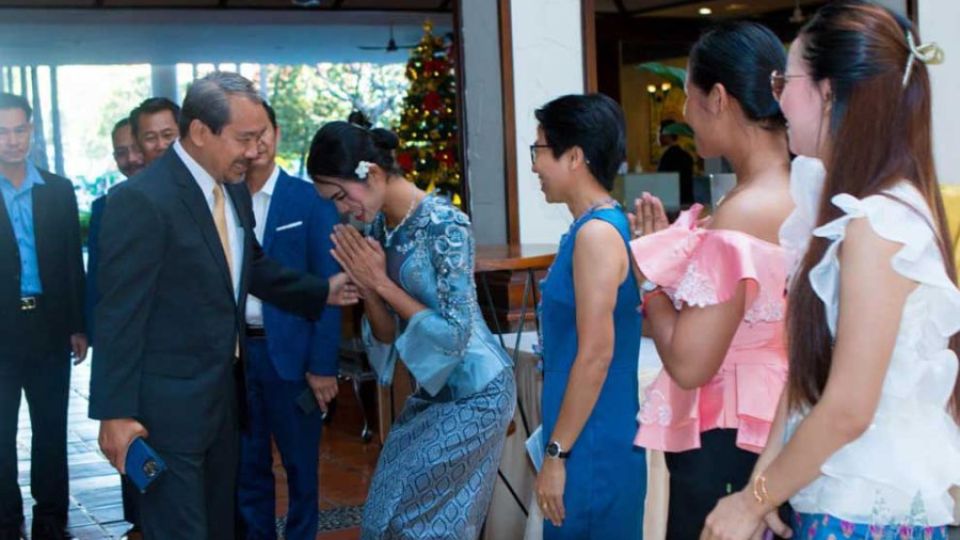December 7, 2023
PHNOM PENH – In a move towards fostering dialogue and collaboration, members of the LGBT community in Cambodia have suggested the formation of a joint working group led by the government.
This endeavour aims to foster discussions and collective efforts towards the development of marriage laws tailored to the needs of LGBT individuals.
The proposal emerged during a dialogue on December 4, wherein representatives from state institutions and stakeholders convened to discuss the progression of initiatives aimed at advancing the recognition of marriage law equality for same-sex couples in Cambodia.
During his introductory address, Keo Remy, president of the Cambodian Human Rights Committee (CHRC), underscored a significant challenge facing Cambodia.
He mentioned the persistent challenge in eliminating discrimination against LGBT individuals within their families and communities, attributing this challenge to the entrenched adherence to traditional culture among parents.
He said that despite encountering limited instances of discrimination, the advancement of LGBT rights has improved significantly. This positive shift is attributed to directives from both former and current Prime Ministers, extending to national and sub-national levels. Notably, supportive national policies from the Ministry of Women’s Affairs have also played a crucial role in this progress.
“I understand the legitimacy of the demand for marriage law recognition, acknowledging it as a fundamental right. However, altering perspectives within families and communities requires time. Once awareness regarding the LGBT community’s aspirations permeates families and communities, a heightened sense of compassion towards LGBT individuals is expected to evolve,” Remy said.
He remarked that, concurrently, discrimination against LGBT individuals persists not only in Cambodia but also in other nations. Additionally, there are reported assaults on LGBT supporters, particularly in areas where existing legal restrictions present challenges to the rights and well-being of the LGBT community.
During discussions with representatives from state institutions and stakeholders, Ly Pisey, the founder and coordinator of the Rainbow Community Kampuchea (RoCK) – a local NGO founded in 2009 to advocate for equal rights and protection of lesbian, gay, bisexual and transgender people in Cambodia – said the LGBT community has formally proposed the creation of a collaborative working group.
This group is intended to operate under the auspices of the CHRC and garner support from relevant ministries, institutions as well as representatives of the LGBT community.
Marital equality promotion
Pisey said the intent behind the request is to engage in discussions, conduct a comprehensive study and review the essential legal framework. This endeavour aims to further the promotion of marital equality for the Kingdom’s LGBT community.
“It is viable to establish a working group comprising government representatives equipped with commendable legal and research resources. This group would engage in discussions regarding the legal aspects of our potential actions, paving the way for progress. Without collaborative dialogue, the formulation of this law remains likely unattainable,” she said.
Doeun Chandara, the administration director of the Office of Private Security Management at the Ministry of Interior, said Cambodia welcomes the prospect of same-sex marriages. However, current limitation exists, preventing the registration of their marriages. Essentially, LGBT individuals can only conduct wedding ceremonies in their localities without legal recognition.
He explained that the registration of LGBT marriages remains unattainable until legal amendments occur, a process requiring time.
“The creation of this collaborative working group, representing the government, poses challenges because such a group has not been previously formed. Historically, there has only ever been the establishment of a central authority and advisory council comprising political parties and the government,” Chandara said.
“We foresee a degree of complexity in determining the chairmanship of the working group, the overseeing ministry, the relevant institutions and the appropriate channel by which to approach the government. Another obstacle lies in the constraint of time, given the substantial workload of state institutions,” he added.
He said that while there might be challenges in setting up this collaborative working group, the process becomes straightforward once the group is established and facilitated through the submission of a letter or request form.
As of December, 35 countries, covering 17 per cent of the world’s population (1.4 billion people), legally perform and recognize same-sex marriages. These nations’ experiences indicate that equality in marriage law positively influences family dynamics, reduces discrimination against the LGBT community and enhances social harmony, according to RoCK.


